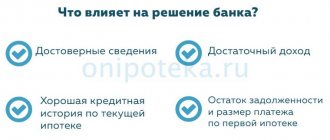The more accessible lending becomes, the more bank clients learn about their rights and opportunities. For example, previously, insurance for any loan (consumer loan, credit card, mortgage, etc.) was considered an accompanying service that could not be refused. Today, the borrower is against naming policies, and refusal of loan insurance is a common occurrence. Let's consider what the law and banking practice say on this matter.
Apply for a consumer loan
What does loan insurance provide?
Insurance is designed to financially protect the bank and the borrower from the consequences of unforeseen situations. Today there are four main types of this service:
- Life and health insurance - valid in the event of illness or death of the policyholder, when the insurance company takes over the debt;
- Job loss insurance - makes it possible not to pay the bank the balance of the debt;
- Insurance of collateral – guarantees compensation to the bank if the collateral is damaged or damaged;
- Title Insurance – In effect if title to a property (such as a home) is lost.
Loan “For any purpose” Bank “Otkritie”, Lit. No. 2209
from 5.5%
rate per year
up to 5 million
for up to 5 years
Apply now
Only two services are mandatory: car and real estate insurance.
Other types of insurance are voluntary, and borrowers often want to save money on these policies. This approach is explained by the disadvantages of insurance, which together can outweigh all the advantages: Pros and cons of loan insurance
| pros | Minuses |
| With life insurance - financial protection of the bank and the borrower | It is difficult for the parties to confirm insurance cases (a cumbersome procedure); insufficient amount of payments |
| When insuring against job loss, there is a guarantee of payments to the financial institution even during a crisis | The list of insured events is limited to the liquidation or bankruptcy of a legal entity (dismissal is not taken into account) |
| When insuring collateral - protection from the latest emergency and other issues. incidents | The bank often wins, and it is difficult for the borrower to prove that damage to property is not his fault |
If the client does not see benefits for himself, he has the right to refuse life, title and loss of income insurance policies. But how realistic is it to reach an agreement with a bank that has a vested interest in insurance? Let's consider the position of the law on this matter.
Cash loanHome Credit Bank, Persons. No. 316
from 5.9%
rate per year
up to 3 million
for up to 7 years
Apply now
Does the bank have the right to impose insurance?
Theoretically, of course, he does not have such a right. The Central Bank is clear that voluntary insurance policies must be purchased by borrowers at their will without influence. But this is just a theory. In practice this practically doesn't work. The reason is that the fact of imposition is almost impossible to prove in the event of a trial.
It turns out that the borrower signs the insurance application of his own free will. His signature means that he has read all the clauses of the agreement and agrees with them. What complaints can there be later: here is your signature!
Standard tricks that managers use:
- Insurance is included in the loan by default. Almost no one reads the signed papers—that’s a fact. In my practice, out of 1000 loans issued, maybe only 2 people carefully studied what they signed. The rest are simply glad that they were approved and are in a hurry to get the money.
- They say that without insurance, a loan cannot be issued. This is a blatant lie: if a client complains, the manager will not be patted on the head. However, such assurances are still often heard.
- They say that without insurance, the loan will not be issued. In practice, if the client is of high quality, the bank will give him approval in any case. For lack of insurance, the scoring score is reduced, but not significantly.
Only collateral insurance is required when applying for secured loans. Life, health, and job loss insurance are all voluntary paid services.
Is it possible to refuse insurance after receiving a loan?
For a long time it was believed that insurance is a mandatory “attribute” of any loan. However, the Civil Code of the Russian Federation and the Central Bank have decided: the borrower has the right not only to refuse the policy, he also has the right to return the money for it. The catch is that a credit institution may completely refuse a loan to such a client without giving a reason.
But more often the applicant will be given a choice:
- Apply for a loan with insurance, but at a more favorable interest rate;
- Give up insurance, but pay a higher monthly rate.
Clients are afraid that a loan without a policy will be expensive, so under pressure from the bank they choose to pay for an unnecessary service. In practice, a higher percentage may be more profitable than the cost of the policy. So, in some cases, insurance amounts to up to 50% of the entire loan.
Take out a loan secured by an apartment
If the borrower decides to take out a loan without insurance, he must comply with the following conditions:
- The possibility of returning the money is indicated in the contract. If there is no documentary evidence, it is difficult to obtain a refund through court.
- From 01/01/2018, you can return the full cost of the policy within 14 calendar days from the date of conclusion of the contract (the so-called cooling period), unless an insured event occurs.
- You can partially return the cost of the policy by repaying the debt to the bank ahead of schedule.
- Only borrowers who have no late payments can return the insurance.
Cash loan Raiffeisenbank, Lic. No. 3292
from 4.99%
rate per year
up to 3 million
for up to 5 years
Apply now
An important nuance concerns the size of payments - full or partial. If at the time of cancellation of insurance the policy has not yet taken effect, the client returns the full cost. If the insurance agreement has entered into force, the company will deduct the amount for the time that the borrower was under its financial protection.
How I refused insurance services
As an example, I will give situations that I personally encountered as an active user of credit services. In general, in reality it is not always outright imposition that appears. If the borrower behaves confidently and gives a categorical refusal, the manager will accept his desire as inevitable.
Renaissance
I applied for a simple cash loan through a bank office. The manager began to insistently push for insurance and simply did not start submitting the application for consideration.
As a result, I had to call the bank's hotline and complain about this intrusiveness. There, the operator also began to talk about the benefits of insurance, but still made it clear that the employee was acting unlawfully.
At the end of the conversation, I approached the manager, he heard the end of the dialogue. He had to accept defeat and accept my application without insurance. The Renaissance loan was successfully approved and issued.
Trust
Now this bank no longer issues loans to individuals, but used to actively lend. Here I was faced with a very serious imposition of a service. I took out an urgent loan, and the manager put pressure on this: he would not accept an application without insurance. Moreover, we were not talking about life insurance, but about real estate...
In the end, I made a cunning move. I said okay, I'll buy insurance. The manager happily sent the application for consideration, it was approved immediately, I signed the contract and received the money. But I simply refused to sign the insurance contract and pay the insurance premium (I was supposed to pay using the funds from the issued loan).
But this option is only relevant if the policy is paid for separately and is not included in the body of the loan.
Alfa Bank
With this bank I had an unsuccessful refusal of the insurance imposed by the bank. The whole point is that I applied for a POS product loan at a household appliances store. I immediately told the manager not to include insurance in my credit. She spoke categorically so that there would be no imposition.
As a result, the manager said that the bank refused me. Only now I had my suspicions... She somehow quickly filled out the form and asked an incomplete list of questions. And I’m a positive client, I constantly took out loans from Alfa.
Since I myself was then a representative of Alfa-Bank, only for a different product, I looked at the situation for me through my channels and simply did not see my application in the database. The manager, apparently in order not to spoil her insurance statistics, simply did not send my request for consideration. It also happens…
Sberbank
My brother took out a cash loan to buy a car. I submitted the application myself and went with me to sign the contract. He is just one of the army of borrowers who do not read anything and do not particularly understand financial documents.
I asked to read the contract before signing. And to my surprise, instead of the 200,000 rubles issued on credit, the contract showed an amount of about 230,000. It was my brother who was forced to insure the loan. But he didn’t even understand - a standard case.
I pointed this out to my brother, who began to declare that he did not need financial protection (as it is called in Sberbank). Even the head of the department came with her persuasion. But the loan had already been approved, so Sberbank employees had to simply remove the insurance and issue a “naked” loan.
How to refuse unnecessary Sberbank insurance?
Sberbank, being a major lender, applies a policy to its entire product line. Using a bank as an example, let’s look at what to do for a client who decides to refuse an additional service:
- Go to any Sberbank branch and ask for an application form to waive insurance (you can write the document entirely by hand). It indicates: the name of the insurance company, address, personal data and details.
- Prepare a package of papers, including: a copy of the passport, a copy of the loan agreement, a copy of the policy, a certificate stating that the borrower has no open debts to the bank. Attach a statement to the documents.
- Present the documents at a Sberbank branch or send them by mail, ordering a receipt.
- Wait for Sberbank's decision on the application and subsequent crediting of funds.
- If they refuse to accept a package of papers, the client has the right to write a complaint to the management of the financial institution, and in extreme cases, contact directly the Central Bank, Rospotrebnadzor or the Prosecutor's Office.
Loan for large amounts SKB-Bank, Lits. No. 705
from 5.1%
rate per year
up to 1.6 million
for up to 5 years
Apply now
Get a loan with a bad history
Experienced borrowers know that insurance can be waived at the time of concluding a loan agreement. To do this you need:
- At the time of applying for a loan, inform that you do not need insurance.
- Write a statement of refusal, insisting on putting an acceptance mark on it.
- If a Sberbank employee does not accept the application, send it by mail (with the connection of Norvik Bank (Vyatka Bank), Personnel No. 902
from 8.8%rate per year
up to 20 million
for up to 20 years
Apply now
A sample waiver of insurance accepted by Sberbank is presented below:
Why do banks impose insurance?
For any bank, this is an excellent and simply inexhaustible channel for generating additional income. Hundreds of millions of rubles are circulating in this area, which bankers receive from insurers as payment for selling policies.
The profit is simply colossal. Out of a thousand issued loan agreements with insurance, a maximum of 5 will be “shot.” These 5 borrowers or their heirs will receive compensation when an insured event occurs, and the remaining 995 will pay for nothing.
In fact, insurance is not imposed by the bank itself, but by its representative, that is, the manager who accepts the loan application. And this happens for a reason. Banks initially put employees in such a position that they are forced to literally force borrowers to sign insurance contracts.
Personally, in my case it was like this:
- I received a premium for insurance only if 95% of the loans I issued in a month were issued with the inclusion of insurance services.
- If I did less than 95%, not only will I not receive a bonus, but questions will also arise for me - am I such a good employee if I cannot fulfill the plan?
So managers who hold on to their jobs and want to earn money have to somehow get out of the situation and issue maximum loans with insurance. Moreover, the management says that it is impossible to deceive clients, but at the same time creates such conditions that managers are forced to do this. Well, then the employee if something happens is extreme.
How to return insurance if it was imposed?
On January 1, 2021, the Central Bank issued a new directive extending the “cooling off period.” Now, within 14 days from the date of signing the contract, the borrower has the right to return the full cost of the insurance. If the claim is received later, the insurer partially reimburses the amount of the policy - minus the time that the insurance was actually in effect.
You can request a refund in two ways:
- By contacting the bank with a written request;
- Through litigation.
Comments: 2
Your comment (question) If you have questions about this article, you can tell us. Our team consists of only experienced experts and specialists with specialized education. We will try to help you in this topic:
Author of the article Irina Rusanova
Consultant, author Popovich Anna
Financial author Olga Pikhotskaya
- Vladimir
10/12/2021 at 00:47 Hello. Please tell me, if I refuse life insurance within 14 days, does the bank have the right to raise the loan interest rate? I asked a question earlier. I don't see the answer. Is this a scam?
Reply ↓ Anna Popovich
10/13/2021 at 01:59Dear Vladimir, the rate can be changed if the corresponding condition is specified in the loan agreement.
Reply ↓
Insurance return procedure
Refund of insurance is available if less than 5, 14 or 30 days have passed since the date of signing the loan agreement (“cooling period”), depending on the bank and the terms of the agreement. The procedure for returning insurance payments to the borrower is as follows:
- The client applies to the insurance organization with an application for refusal of insurance or sends it by mail. The application should indicate:
- Full name, passport details of the borrower;
- contract number;
- details of the account to which the payment will be received.
- The borrower additionally attaches to the application a copy of the insurance contract and a document confirming full payment of premiums.
- The insurance company carries out the procedure for reviewing the application and documentation package. If the requirements for the return of the insurance payment are met, it terminates the insurance contract and transfers the funds requested by the client to his account. The insurance company has the right to deduct from the returned insurance funds the amount spent on providing insurance.
IMPORTANT!
If the result of consideration of the application is a refusal to return insurance premiums, then you should begin pre-trial measures, contact a higher authority (Rospotrebnadzor, Central Bank) or begin legal proceedings.
Return to the "cooling period"
During the “cooling-off period,” the insurance is not refunded in full, but most of it will still be returned to the owner. This is due to the fact that the insurance is valid and funds are collected for it.
ATTENTION!
During the “cooling off period” it is impossible to make refunds under collective insurance contracts.
What types of insurance payments can be returned during the “cooling off period”?
During the “cooling-off period,” you can return your insurance by canceling certain types of voluntary insurance contracts:
- life insurance;
- insurance against financial risks;
- insurance against sudden loss of employment without the consent of the employee;
- insurance of movable and immovable property;
- insurance against deprivation of rights to own real estate.
What types of insurance payments cannot be returned during the “cooling off period”?
It will not be possible to return insurance during the “cooling off period” in a number of cases:
- registration of a CASCO agreement;
- insurance of real estate purchased with a mortgage, as well as collateral real estate;
- medical insurance, which is provided for foreign citizens, stateless persons and citizens of the Russian Federation located outside of Russia;
- motor vehicle liability insurance under international insurance systems;
- insurance of persons performing certain activities, admission to which is a certain type of insurance.
Procedure for returning insurance during the “cooling off period”
Payment of funds spent on the purchase of insurance by the client is possible if a direct agreement is concluded with the insurance company. To do this, the borrower will need to perform 3 steps:
- Come to the insurance organization with an identification document and a statement confirming the client’s refusal of insurance and the return of the insurance premium. The application must indicate the bank account number to which the returned funds will be transferred.
- Attach the following documents to the application:
- copy of passport;
- insurance contract;
- document confirming the fact of payment for insurance.
- Wait for your account to be refunded. They must arrive no later than the 10th day from the date of application.
REFERENCE!
If it is not possible to visit the insurance company, then the borrower should fill out an application independently and send it by mail along with the necessary documents to the nearest office of the insurer.
How is the “cooling off period” calculated?
The “cooling off period” begins the day after signing the loan agreement. This document expires upon submission of the application to the insurer. Therefore, if the application takes more than 5 days to reach the insurance organization, the agreement will have time to come into force.
The insurer will still be obliged to return the money, but by subtracting from it the amount for the days the contract was valid.
ATTENTION!
Days that are holidays and weekends according to the calendar are not taken into account when calculating the “cooling off period”.
What type of insurance can be returned?
Refund of insurance funds is possible for any paid types of voluntary insurance, which include: health, life and financial insurance.
It will not be possible to return the insurance if it was put forward as a requirement, only upon fulfillment of which it is possible to obtain a certain type of loan. For example, OSAGO and CASCO for purchasing a car on credit, real estate insurance when buying an apartment with a mortgage.
Also, a refund of insurance is not possible if the contract is signed under a group insurance program.
IMPORTANT!
You should study the agreement in detail, which usually stipulates the main conditions for its termination and the procedure for returning the paid contributions.
Non-refund of insurance premium upon early repayment of loan
If you repay the loan before the term established by the contract, there is practically no chance of getting back the paid insurance payments. This is due to the fact that many Russian banks issue an insurance policy for the entire loan repayment period. Therefore, money for insurance payment is withdrawn once for the entire period at the very beginning of repayment of the loan debt.
Let's give an example: a loan was taken out for 300 thousand rubles for 5 years, for which the insurance premium was 30 thousand rubles. The loan was repaid ahead of schedule - after 2 years; in fact, 12 thousand were spent on insurance, and 18 thousand rubles remained with the bank. Therefore, in order to return the balance, the borrower should, along with the application for early repayment of the loan, at the same time submit an application for the return of the remaining insurance funds.
Return of insurance with the help of specialists from a legal or brokerage company
Returning insurance with the assistance of lawyers or brokers is suitable for a borrower who does not want to deal with the return of funds on his own, but only wants to get a finished result. In this case, specialized companies will carry out the necessary measures, payment for which will be made in the form of commission deductions from the amount of the returned insurance. The process of returning insurance funds will occur in the following order:
- The client selects the website of a law or brokerage firm and leaves a request on it.
- When receiving a letter or receiving a call from the company, the client explains to the specialist the details of the situation that has arisen with the return of insurance payments.
- The borrower sends all the necessary information by mail or comes with documents to the company’s office.
- After analyzing the documents, the specialist sets the minimum and maximum allowable refund amount. If the established conditions suit the borrower, then he enters into a contract for the provision of services with the company.
- Afterwards, the intermediary company organizes the entire range of measures for the return of insurance funds: prepares documentation for the credit and insurance institutions, monitors the process of consideration of the request and, if necessary, transfers the case to the court, starting the trial.
- The insurance payment is made to the borrower’s account, who, from the amount received, pays a commission to the legal or brokerage company that was involved in obtaining insurance for the client.
REFERENCE!
If the intermediary manages to return the funds without legal proceedings, they will be transferred to the borrower’s account within 10 days. If the refund is carried out through legal proceedings, then the period for receiving them may take up to 3-4 months.
Official website of the Supreme Court of the Russian Federation
As the Court indicated, the creditor must give the client the right to independently insure his life, health or other interest in favor of the bank in accordance with established criteria.
According to one of the AG experts, the conclusions of the RF Armed Forces will have a positive impact on judicial practice.
Another noted that although they do not remove all restrictions for the borrower on life insurance in other insurance companies other than those offered by the bank, they limit the possible abuse by the lending institution. On July 27, the Supreme Court issued Ruling No. 11-КГ21-15-К6 on a dispute regarding a bank’s increase in the interest rate on a loan due to its client changing the insurer. In August 2021, Farkhat Galiullin issued a consumer loan for 1.4 million rubles from PJSC JSCB AK BARS. for a period of 7 years. Along with the loan agreement, the borrower signed an insurance agreement, since thus the interest rate on the loan was 10.9% per annum, and in the event of failure to submit an insurance agreement to the bank or termination of such an agreement - 18.5% per annum. The terms of the loan agreement provided for the bank to provide the borrower with the service of joining the collective life, health and financial risk insurance program, under which the latter would act as the insured person under an agreement concluded between the bank and AK BARS Insurance LLC.
On the day the loan agreement was concluded, Farkhat Galiullin signed an application for collective insurance for life, health and financial risks. A few months later, the man entered into an agreement with Zetta-Insurance LLC and sent to the bank a copy of the insurance policy issued by the new insurer. Since the bank regarded such actions of the citizen as improper fulfillment of obligations for life and health insurance, it increased the interest rate on the loan to 18.5%.
Next, Farhat Galiullin filed a lawsuit against the bank to declare illegal the refusal to reduce the interest rate on the loan, the obligation of the defendant to accept the insurance policy of the Zetta-Insurance company and reduce the interest rate on the loan, as well as recalculate debt and payments based on the interest rate 10 .9% per annum. The plaintiff also asked to be awarded compensation for moral damage in the amount of 10 thousand rubles.
The claim was denied, and the appeal and cassation supported this decision. Thus, the first instance found that the increase in the interest rate under the loan agreement was made by the defendant within the framework of the agreement reached between the parties on the terms of the loan and was associated with the plaintiff’s failure to fulfill the obligation to insure life and health. The appeal added that when concluding a loan agreement on individual terms, the bank had a certain additional property interest (a commission of 3% per year of the loan amount for joining the collective life and health insurance program), and therefore it reduced the interest rate on the loan up to 10.9%.
Disagreeing with the approach of the courts, Farkhat Galiullin appealed to the Supreme Court of the Russian Federation.
Having studied the case materials, the Judicial Collegium for Civil Cases of the Supreme Court explained that under a consumer loan agreement, the lender does not have the right to condition the provision of a credit (loan) and the interest rate on it on the borrower’s obligation to simultaneously conclude an insurance agreement with a specific insurer. The borrower should be given the right to independently insure his life, health or other interest in favor of the lender from an insurer that meets the criteria established by the lender in accordance with the legislation of the Russian Federation. However, it does not follow from the law that such a right is granted to the borrower only at the time of concluding the loan agreement.
“In refusing to satisfy the claim, the court of first instance, in violation of the above provisions of the law, proceeded from the fact that refusal of an insurance contract with a specific, individually determined insurer and the borrower’s independent conclusion of an insurance contract with another insurer are in themselves a violation of the terms of the loan agreement, allowing the bank increase the interest rate on the loan. At the same time, the court did not establish whether the borrower had such an opportunity at the time of concluding the loan agreement, whether he had the opportunity to choose an insurer according to the criteria established by the lender, and whether these criteria were also determined in accordance with the legislation of the Russian Federation,” the definition noted.
The panel of judges added that the insurance contract concluded by the borrower independently must first of all meet the criteria established by the lender in accordance with the legislation of the Russian Federation. In turn, the appeal did not establish whether the bank determined such criteria when concluding the loan agreement and whether the insurance agreement Galiullin independently concluded met these criteria. Thus, the Judicial Collegium for Civil Cases of the RF Armed Forces canceled the judicial acts of appeal and cassation, returning the case to the second instance.
Moscow AP lawyer Oleg Lisaev noted the Supreme Court’s direction that the bank has the right to oblige the borrower to insure his life, health or other interest in favor of the lender with an insurer that meets the criteria established by the bank: “These criteria must comply with Russian legislation, and the borrower has the right to choose an insurer, and not only at the time of concluding a loan agreement.”
According to the expert, in the dispute under consideration, the bank’s actions were illegal, and they should be regarded as the imposition of a paid service and a violation of consumer rights. “These conclusions of the RF Armed Forces will have a positive impact on judicial practice. I always welcome the situation when the court defended a citizen as the weaker party. The consumer of a financial service is dependent on the bank, which has the opportunity to impose its unfair conditions, and only the court can put an unscrupulous creditor in its place,” emphasized Oleg Lisaev.
Partner of the law firm Law & Commerce Offer Anton Alekseev also positively assessed the ruling of the RF Armed Forces. “An important point in the assessment of the case in this case was the borrower’s compliance with the insurance criteria established by the lender itself, as a condition for maintaining a lower loan rate, and not insurance with a specific insurance company. Otherwise, the need for life insurance when lending to a specific insurance company may be regarded as imposing the services of a specific person on the consumer, which is unacceptable,” he believes.
According to the expert, the conclusions of the Supreme Court, of course, do not remove all restrictions for the borrower on life insurance in other insurance companies, in addition to those proposed by the bank, but they limit possible abuse on the part of the credit institution. “Perhaps, in the case under consideration, the bank will develop specific insurance criteria for lending, which will correspond to the insurance conditions of a specific “bank-friendly” insurance company and thereby limit the possible choice of insurance companies for the borrower,” Anton Alekseev suggested.
Zinaida Pavlova
Is it possible to return the insurance if the loan is repaid early?
After repaying the loan ahead of schedule, the return of the insurance portion of the funds is carried out on legal grounds, in which, immediately after the last payment, it is necessary to study the agreement document in detail and determine whether it is possible to return the contributions spent on the insurance procedure.
If the loan agreement does not contain a condition guaranteeing the return of insurance upon early repayment of debt, the bank and insurance company may legally refuse to pay the deposited funds.
If the above clause is specified in the contract, then the borrower may not receive funds in full, but only for the period when the client did not use the insurance service.
The return of insurance to the borrower in case of early repayment of the loan is carried out in the following order:
- Submitting an application for loan repayment before the deadline established by the agreement and receiving your account details.
- Visiting an organization providing insurance services and submitting an application for a refund of funds spent on insurance and a package of documents, which includes:
- passport;
- loan agreement;
- insurance policy that was issued upon concluding the loan agreement;
- a document confirming the absence of debt to the bank;
- all checks for payment of the basic insurance premium.
- Waiting for a decision from the insurance company. If the decision is not in favor of the borrower, he must file an appeal in court to receive insurance payments.
Dirty methods used by banks to refund insurance
To not return insurance funds to the borrower, credit institutions quite often use dishonest methods:
- Delaying deadlines. This method consists in the fact that the bank client, having demanded the return of insurance, does not receive it within the established period due to the fact that these terms have increased. Employees of a credit institution may indicate the absence of the applicant’s name in the register of insured persons as the reason for extending the consideration period. Since it is impossible to verify this information, most borrowers, trusting the words of the bank, stop at this stage and do not receive their money. However, in this case, it is necessary, on the contrary, to continue the fight, threatening the bank and the insurance company with a lawsuit for the illegal use of the client’s funds and media coverage of this unpleasant situation. Usually, after such an impact, the review is accelerated, and the client receives his funds in the shortest possible time.
- Forgery of documents. This method is usually used after delays, inviting the client to sign a new application for the return of insurance instead of the previously submitted one, which was allegedly lost during the consideration period. A copy of the application is not given to the client, but is kept by the employees of the credit institution. And the original is “very conveniently” lost in the jar. As a result, if the client does not sue the credit institution, he loses his money.
In both cases, the client did not have to go to the bank to return insurance funds, but contact the insurance company directly.
Afterwards, write an application in 2 copies for the return of insurance funds and be sure to make copies of the originals of all documents.
Then, having submitted the application, the borrower must receive a second copy of it, which contains the date and signature of an employee of the insurance company. Since this document is proof that the application was submitted and accepted by insurers on time.
Ways to evade banks from returning insurance
After the introduction of “banks and insurance companies were forced to develop several technologies to avoid the borrower from refusing insurance. Here are some basic ones:
- Default. In this situation, many borrowers are simply not notified about the possibility of returning insurance funds, and they, out of ignorance, do not use this opportunity.
- Collective credit insurance. In this case, the insuring party is not the borrower, but the bank. This leads to infringement of the client’s rights: unjustifiably larger payments and the complete absence of a “cooling off period”, since it cannot be applied to a legal entity, which is a credit institution.
Is the return of insurance funds a legal procedure?
The return of the borrower's insurance premiums is regulated by the instructions of the Bank of Russia dated November 20, 2015, according to which the company providing insurance services undertakes to return the above-mentioned funds at the request of the client.
The full amount of insurance can only be collected during the “cooling off period”. Afterwards, it will be more difficult to return the full amount of insurance payments, so the client needs to study the received loan agreement and instructions on the return of insurance payments before signing it.











